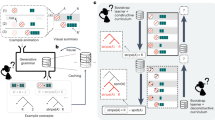Abstract
It is well known that our prior knowledge and experiences affect how we learn new concepts. Although several formal modeling attempts have been made to quantitatively describe the mechanisms about how prior knowledge influences concept learning behaviors, the underlying cognitive mechanisms that give rise to the prior knowledge effects remains unclear. In this paper, we introduce a computational cognitive modeling framework that is intended to describe how prior knowledge and experiences influence learning behaviors. In particular, we assume that it is not simply the prior knowledge stored in our memory trace influencing our behaviors, but it is also the learning strategies acquired through previous learning experiences that affect our learning behaviors. Two simulation studies were conducted and the results showed promising outcomes.
Preview
Unable to display preview. Download preview PDF.
Similar content being viewed by others
References
Murphy, G., Medin, D.: The role of theories in conceptual coherence. Psychological Review 92, 289–316 (1985)
Heit, E., Bott, L.: Knowledge selection in category learning. In: Medin, D.L. (ed.) Psychology of Learning and Motivation (1999)
Rehder, B., Murphy, G.L.: A Knowledge-Resonance (KRES) model of category learning. Psychonomic Bulletin & Review 10, 759–784 (2003)
Matsuka, T., Sakamoto, Y.: A Model of Concept Formation with a Flexible Representation System. In: Advances in Neural Networks, ISNN07. Lecture Notes on Computer Science, vol. 4491, pp. 1139–1147. Springer, Heidelberg (2007)
Matsuka, T., Sakamoto, Y.: Integrating a Flexible Representation Machinery in a Model of Human Concept Learning. In: Proc. of IJCNN2007. Forthcoming (2007)
Robins, A.: Catastrophic forgetting, rehearsal and pseudorehearsal. Connection Science 7, 123–146 (1995)
French, R.M.: Catastrophic forgetting in connectionist network. Trends in Cognitive Sciences 3, 128–135 (1999)
Grossberg, S.: Competitive learning: from interactive activation to adaptive resonance. Cognitive Science 11, 23–63 (1987)
Matsuka, T., Chouchourelou, A.: A Model of Human Category Learning with Dynamic Multi-Objective Hypotheses Testing with Retrospective Verifications. In: Proc. IJCNN 2006, pp. 3648–3656 (2006)
Anderson, J.R., Bothell, R., Lebiere, C.,̇ Matessa, M.: An integrated theory of list memory. Journal of Memory and Language 38, 341–380 (1998)
Pazzani, M.: The influence of prior knowledge on concept acquisition: Experimental and computational results. Journal of Experimental Psychology: Learning, Memory & Cognition 17, 416–432 (1991)
Wattenmaker, W.D., Dewey, G.L., Murphy, T.D., Medin, D.L.: Linear separability and concept learning: Context, relational properties, and concept naturalness. Cognitive Psychology 18, 158–194 (1986)
Barrett, S.E., Abdi, H., Murphy, G.L., McCarthy Gallagher, J.: Theory-based correlations and their role in children’s concepts. Child Development 64, 1595–1616 (1993)
Barsalou, L.W.: Ad Hoc Categories. Memory and Cognition 11, 211–227 (1983)
Medin, D.L., Ross, B.H., Markman, A.B.: Cognitive Psychology (4th Ed.) Hoboken, NJ: Wiley (2005)
Author information
Authors and Affiliations
Editor information
Rights and permissions
Copyright information
© 2007 Springer-Verlag Berlin Heidelberg
About this paper
Cite this paper
Matsuka, T., Sakamoto, Y. (2007). A Cognitive Model That Describes the Influence of Prior Knowledge on Concept Learning. In: de Sá, J.M., Alexandre, L.A., Duch, W., Mandic, D. (eds) Artificial Neural Networks – ICANN 2007. ICANN 2007. Lecture Notes in Computer Science, vol 4669. Springer, Berlin, Heidelberg. https://doi.org/10.1007/978-3-540-74695-9_93
Download citation
DOI: https://doi.org/10.1007/978-3-540-74695-9_93
Publisher Name: Springer, Berlin, Heidelberg
Print ISBN: 978-3-540-74693-5
Online ISBN: 978-3-540-74695-9
eBook Packages: Computer ScienceComputer Science (R0)




